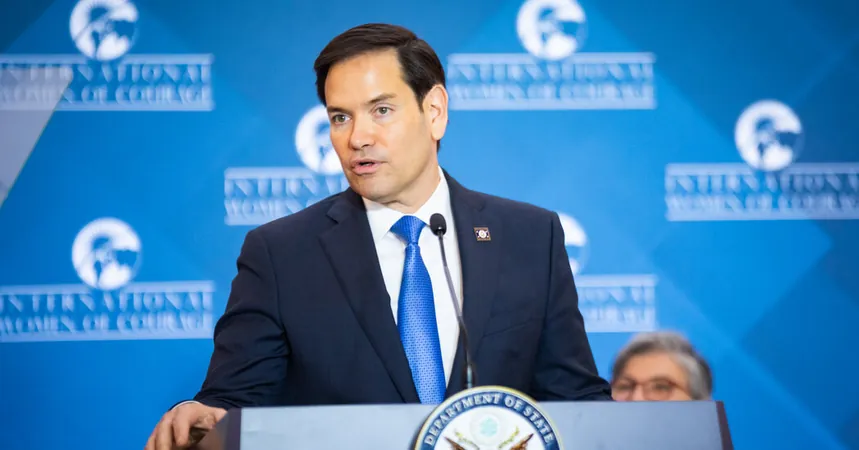
Marco Rubio's NATO Visit: Addressing European Concerns Amid Trump's Controversial Policies
2025-04-03
Author: Wai
Marco Rubio's NATO Visit: Addressing European Concerns Amid Trump's Controversial Policies
In a pivotal visit to Brussels on Thursday, Secretary of State Marco Rubio gathered with NATO foreign ministers to address rising anxieties regarding the Trump administration’s approach to Europe. Key topics on the agenda included escalating tensions surrounding the war in Ukraine, fraught relations with Russia, and the contentious trade war being waged against the European Union.
Rubio's presence at NATO headquarters signals an important shift amidst a backdrop of deteriorating U.S.-European relations, contrasting sharply with the cooperative dynamics of the Biden administration. As President Trump prioritizes a more combative stance, many European officials view Rubio as a reassuring figure, often seen as the most pro-NATO member of Trump's national security team.
In a noteworthy legislative move this year, Rubio—representing Florida in the Senate—co-sponsored a bill requiring any U.S. president to seek Senate approval before withdrawing from NATO. Reports indicate Trump has contemplated such a drastic move, which could jeopardize the security framework established by the 32-nation alliance designed primarily to counter Russian aggression.
Despite doubts surrounding Rubio's influence within the Trump administration—given his somewhat remote relationship with the president—his comments in Brussels aimed to mitigate tensions. "President Trump has made clear he supports NATO. We’re going to remain in NATO," Rubio stated. However, he reiterated Trump's demands for NATO allies to elevate their military spending to reduce reliance on U.S. defense.
This high-stakes dialogue occurs against the backdrop of Trump’s recent announcement of a 20 percent tariff on imports from the EU. Trump has openly criticized the bloc, claiming they "rip us off," and this rhetoric is causing palpable concern among European leaders.
During his discussions at NATO, Rubio will likely advocate for the Trump administration’s controversial calls to end the war in Ukraine swiftly—a suggestion that worries European leaders committed to supporting Ukraine against Russian aggression. Many NATO ministers aim to influence the U.S. agenda, striving to strengthen commitments to Ukraine and strategizing to avoid leaving Kyiv vulnerable to Moscow's advances.
Notable among the attendees, Mark Rutte, the Secretary General, expressed support for Trump’s efforts while carefully navigating the need to maintain alliance solidarity. "I commend President Trump for breaking the deadlock and fully support the efforts undertaken by the U.S. to bring this terrible war to a just and lasting end," Rutte remarked.
Regarding military spending, Rubio aims to foster a commitment for NATO nations to reach a spending goal of 5 percent of GDP. This aggressive target stands in stark contrast with the existing 2 percent guideline, which many NATO nations struggle to meet.
Adding to the complexity of U.S.-European relations, Trump’s controversial stance on acquiring Greenland—a territory of Denmark—has raised eyebrows. Despite Trump's previous shocking remarks, U.S. officials, including Vice President JD Vance, have attempted to downplay military intervention over the issue.
On a more collaborative note, Rubio held a one-on-one meeting with Danish Foreign Minister Lars Lokke Rasmussen. Reports indicate the two reaffirmed strong ties, though the sensitive topic of Greenland was notably absent from their discussions.
Amid these geopolitical dynamics, the newly confirmed U.S. Ambassador to NATO, Matthew G. Whitaker, joins Rubio in Brussels. Despite Whitaker's limited foreign policy experience, his previous roles in Trump’s administration provide an unclear outlook regarding his capability to navigate the complexities of NATO relations.
As the dialogue continues, all eyes will be on whether Rubio can effectively bridge the growing divide between the U.S. and its European allies, ensuring NATO remains a pivotal force in global security.

 Brasil (PT)
Brasil (PT)
 Canada (EN)
Canada (EN)
 Chile (ES)
Chile (ES)
 Česko (CS)
Česko (CS)
 대한민국 (KO)
대한민국 (KO)
 España (ES)
España (ES)
 France (FR)
France (FR)
 Hong Kong (EN)
Hong Kong (EN)
 Italia (IT)
Italia (IT)
 日本 (JA)
日本 (JA)
 Magyarország (HU)
Magyarország (HU)
 Norge (NO)
Norge (NO)
 Polska (PL)
Polska (PL)
 Schweiz (DE)
Schweiz (DE)
 Singapore (EN)
Singapore (EN)
 Sverige (SV)
Sverige (SV)
 Suomi (FI)
Suomi (FI)
 Türkiye (TR)
Türkiye (TR)
 الإمارات العربية المتحدة (AR)
الإمارات العربية المتحدة (AR)